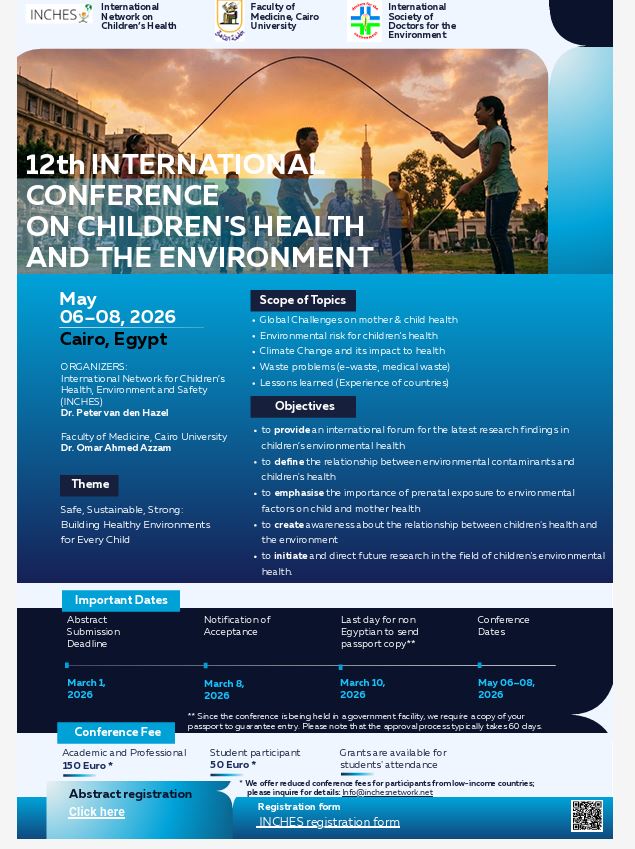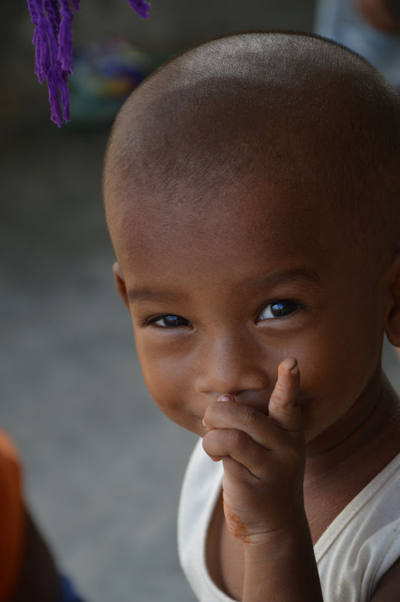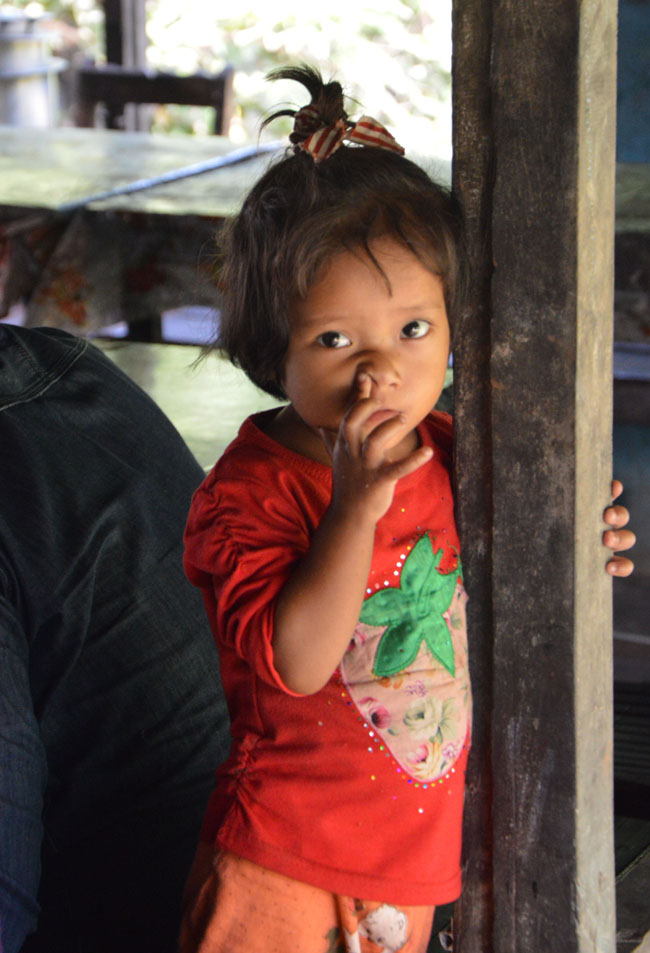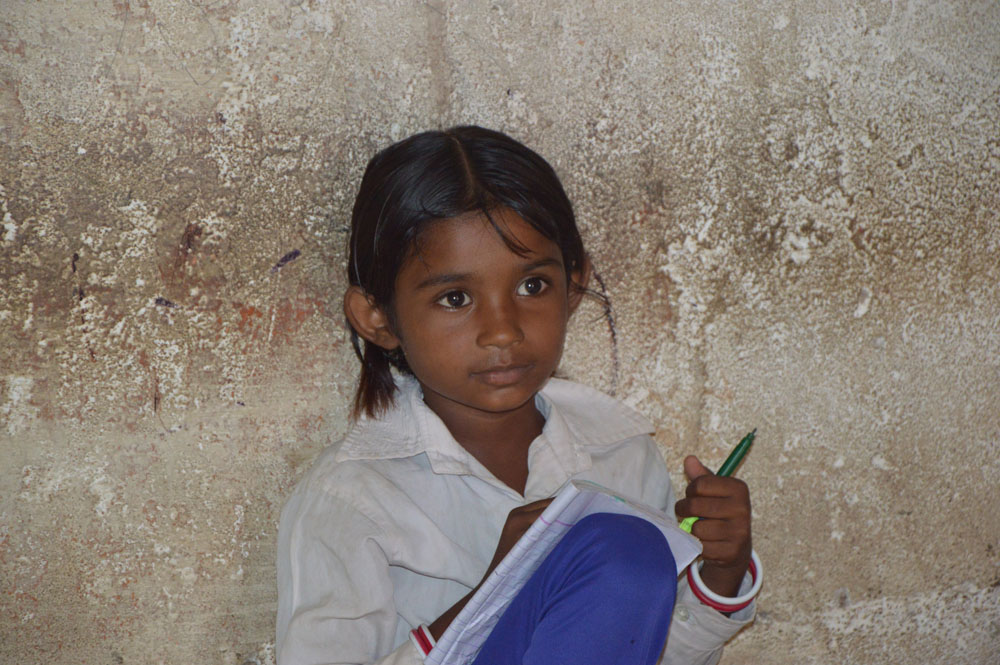Leaflet about 12th Conference

The 12th International Conference on Children’s Health and the Environment
International Conference “Safe, Sustainable, Strong: Building Healthy Environments for Every Child”
We are writing to announce the 12th International Conference on Children’s Health and the Environment, to be held in Cairo, Egypt at the university of Cairo. Two days are dedicated conference days 0n the 6th and 7th of May. And a final day on the 8th of May will be a training day on different topics. Current scheduled training sessions or workshops:
- Green Page: how to screen for environmental exposures in a clinical setting. Moderator: Ferran Campillo i López, PEHSU Catalonia
- Practical approaches to protecting and promoting children’s and adolescents’ health in the context of environmental and public health challenges; Moderator: Caroline Barakat; Faculty of Health Sciences; Ontario Tech University
- Exposome research in children with physical and social exposures; Moderator: Peter van den Hazel, INCHES
- Climental, a youth-led initiative that we believe strongly aligns with the goals of global mapping and showcasing mental health efforts at the intersection of climate and health.
Moderator: Dr. Mohammad Issa
It is an important opportunity to share experiences and scientific advances about children’s health and environment. Scientists, Policy Makers, Pediatricians, Nurses, Doctors, Educators, Urban planners, Interest groups, are all asked to contribute to this international conference. International accreditation points secured!
EXTENDED DEADLINE FOR SUBMISSION OF ABSTRACT until 1st of March
Organizers:
International Network for Children’s Health, Environment and Safety (INCHES)
Faculty of Medicine, Cairo University
WHO, UNEP confirmed
UNICEF, UNFPA, (invited and to be confirmed)
The conference has the following objectives:
- to provide an international forum for the latest research findings in children’s environmental health
- to define the relationship between environmental contaminants and children’s health
- to emphasize the importance of prenatal exposure to environmental factors on child and mother health
- to create awareness about the relationship between children’s health and the environment
- to initiate and direct future research in the field of children’s environmental health.
INCHES has been active to organise webinars. Two webinars on lead and children’s health and one webinar on E-waste and children’s health. has been conducted. INCHES is open tomsupport organisations to organise any webinar or training on chidlren’s environmental heakth This can be done onine or in person, We prefere to conduct training together with local partners. We aim our trainings at a multidisciplinary audience from science, health, environment, risk assessment, social and many other domains. We celebrated very modestly the 10th Conference of INCHES since 1998. But besides celebrating we are also concerned about the state of the planet, of the health of children and the future of vulnerable groups. Therefore we did focus the lat few years on climate change and new emerging challenges in children’s environmental health. INCHES joined the COP26- 30 and collaborated with other groups of health professionals. We supported the efforts to get health into the reports of the COP’s but still too many delegations are not aware enough about all the health consequences of the climate change.
You may support our network and join us. Just give us your support to endorse our work.
Peter van den Hazel, chair of the INCHES Board .
INCHES will disseminate information and initiate research on the relationship between environmental factors and child health. Solid facts and good examples are made easily available on the Internet as the network develops. Parents, researchers and scientists, children’s organizations, children themselves are all potential partners with a stake in INCHES.
Children are more susceptible to most environmental hazards than previously thought. Children are in a dynamic state of growth, as many vital systems such as the nervous, immune, and respiratory systems are not fully developed at birth. Because children are still developing, exposure to environmental hazards may result in disruption of their normal development and may cause damage.
Take a look at the next pages, and please send any news items, comments or suggestions to: info@inchesnetwork.net








